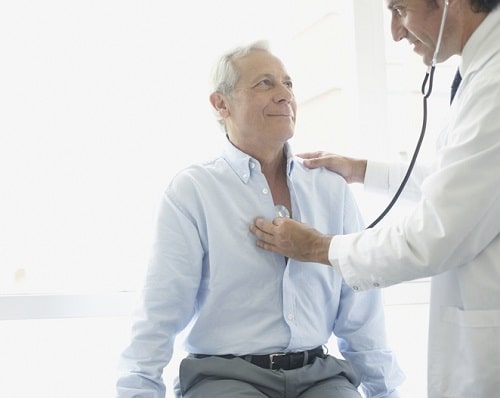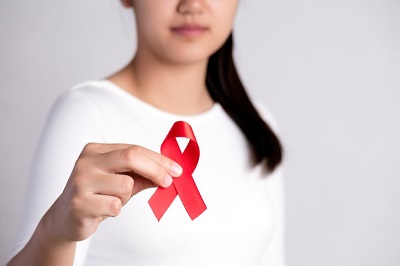HGH for AIDS Patients: What Are the Benefits?

Other than for the treatment of growth hormone deficiency, the use of HGH for AIDS patients is another commonly approved reason a doctor would prescribe human growth hormones.
HGH can make a difference in the life of anyone who has growth hormone deficiency. However, HIV/AIDS patients can reap the benefits of this treatment in numerous ways, including:
- Immune boosting
- Weight management
- Heart health
- Bone-strengthening
- Energy support
- Muscle wasting
- Emotional balancing
Immune Boosting Benefits of HGH for AIDS Patients
The AIDS virus can take a toll on the human body. Patients with HIV/AIDS have a higher incidence of illness due to a weakened immune system. HIV attacks the CD4 T cells that the body uses to fight off infections. There are benefits of HGH for AIDS patients that extend to the immune system because of growth hormone’s impact on the thymus gland.
What does the thymus gland have to do with the HIV/AIDS virus?
The thymus gland is the producer of crucial CD4 and CD8 T cells that fight off invading germs. CD4 cells are extremely important for the body, especially for AIDS patients.
What can happen when HIV destroys these T cells?
Not only will the body not have enough CD4 helper cells to fight infection, but HIV also uses the process of manufacturing those cells to increase HIV cells. Once the CD4 count drops below the 200-mark, HIV progresses to AIDS.
How can HGH help improve T cell count?
The use of growth hormone for AIDS patients can help increase CD4 T cell production as HGH is responsible for cellular regeneration. Together with insulin growth factor 1, which it promotes via the liver, HGH stimulates the creation of the very cells the body needs to thrive. A normal count of CD4 T cells is between 500 and 1,600 per cubic mm of blood.
Weight Loss Benefits of HGH for AIDS Patients
The use of HGH for AIDS patients also helps with weight loss for individuals prone to fat retention. Visceral fat build-up in the truncal area is a critical issue for some people living with HIV/AIDS. Although not life-threatening, increased fat storage can have the following impacts on an individual:
- Increased LDL cholesterol
- Decreased body image and self-esteem
- Overload on muscles and bones to support excess weight
- Higher risk of diabetes and heart disease
- Elevated blood pressure
What is the benefit of growth hormone for AIDS patients who are overweight?
HGH supports the functions of the metabolism so that the body converts and uses food with increased efficiency. Human growth hormone helps to mobilize and burn stored fat to aid in weight loss. Overweight adults can expect to lose around 10 percent of visceral fat deposits primarily in the critical abdominal region where fat crowds the internal organs.
HGH and Heart Health in AIDS Patients
 WordAlong with having a weakened immune system, AIDS patients are also at an increased risk of developing cardiovascular disease. Weight gain is critical component due to placing an added strain on the heart. Also, due to the increased LDL cholesterol, there is a build-up of fat (lipids) in the arteries that lead to plaque formation. Medications used in the treatment of HIV/AIDS may impact cholesterol and triglyceride levels.
WordAlong with having a weakened immune system, AIDS patients are also at an increased risk of developing cardiovascular disease. Weight gain is critical component due to placing an added strain on the heart. Also, due to the increased LDL cholesterol, there is a build-up of fat (lipids) in the arteries that lead to plaque formation. Medications used in the treatment of HIV/AIDS may impact cholesterol and triglyceride levels.
How does HGH help improve heart health?
A benefit of HGH AIDS treatment is that it can help lower LDL cholesterol and support HDL cholesterol in its role of removing excess LDL cholesterol from the bloodstream. Since HGH also helps improve blood cell production and subsequent circulation, it aids heart functions. We often find that people who receive HGH have a higher capacity for exercise which also strengthens the heart. Blood pressure levels also tend to decline to normal range with the use of HGH therapy.
Bone Strengthening Support from HGH for AIDS Patients
Loss of bone density in AIDS patients often leads to weak, brittle bones. They find themselves at a greater risk of fractures and a diagnosis of osteoporosis. Individuals on ART have an even lower bone mineral density level. Bone turnover occurs at an average rate of about 3.6% in healthy adults. HIV/AIDS patients often experience more advanced bone turnover associated with an accelerated aging process.
Why does HIV/AIDS lower bone mineral density?
The bones are made up of four distinct types of cells:
- Osteoblasts – bone-forming cells that secrete calcium salts and collagen matrix that calcifies around the osteoblast
- Osteocytes – mature bone cells formed by the calcified osteoblast that maintain bone tissue
- Osteoclasts – bone-resorbing cells that break down old bone to make way for new osteoblasts
- Osteogenic Cells – the only bone cells that divide, these cells develop into osteoblasts
In patients with HIV/AIDS, osteoclast functions speed up, and osteoblast formation slows down. Old bone is resorbed by the body faster than new bone cells can take their place.
What does HGH do for the bones in patients with AIDS?
The use of HGH for AIDS patients helps to strengthen the bones via the HGH/IGF-1 axis that promotes cell regeneration. Bones are in a continual state of remodeling – a process that allows for the absorption of old bone cells by the body to make way for new bone cells. HGH stimulates the production of new osteoblasts to help strengthen the bones.
Energy, HGH, and AIDS Patients
Lack of energy is another issue many AIDS patients deal with on a regular basis. When you gain weight, the heart has to pump harder to power the body. Increased caloric expenditure is necessary, using up the stored energy in the cells.
How does HGH increase energy levels for AIDS patients?
As human growth hormone helps the body utilize its stored fat, that fat enters the bloodstream where the body’s cells can use it for energy. HGH works at the cellular levels increasing ATP (adenosine triphosphate). ATP is the primary energy source for the cells.
Muscle-Wasting and the Use of HGH for AIDS Patients
Muscle-wasting is one of the most worrisome issues for HIV/AIDS patients. The loss of lean body mass can further weaken the structural support of the body. An individual will lose overall strength and muscle tone. Wasting in AIDS patients is also characterized by deterioration in the internal organs and other tissues.
What is the connection between HGH and AIDS and wasting?
The use of HGH for AIDS patients helps to increase lean body mass. Through the process of cellular regeneration, HGH stimulates muscle cell production. Internal organ growth is also supported by this function of HGH. Individuals who receive HGH therapy often gain an amount of lean body mass similar to the loss of fat mass.
HGH and Emotional Balancing in AIDS Patients
It is hard to remain emotionally balanced when your body is working against you. Muscle and bone loss, frequent illness, and weight gain can take a toll on self-image and well-being. Depression is common with growth hormone deficiency as the brain is home to HGH receptor cells. The risk of depression only increases when a condition such as HIV/AIDS is also present.
How does HGH help reduce feelings of depression and improve emotional health?
HGH benefits AIDS patients emotionally in multiple ways:
- Reaching the growth hormone receptor cells in the brain to stimulate feelings of emotional well-being
- Improving body image and self-esteem by facilitating weight loss and muscle building
- Strengthening the immune system to reduce downtime due to illness
- Increasing energy so that a person can engage in pleasurable activities
To learn more about the benefits of HGH for AIDS patients, please contact our hormone clinic for a complimentary, confidential consultation.

